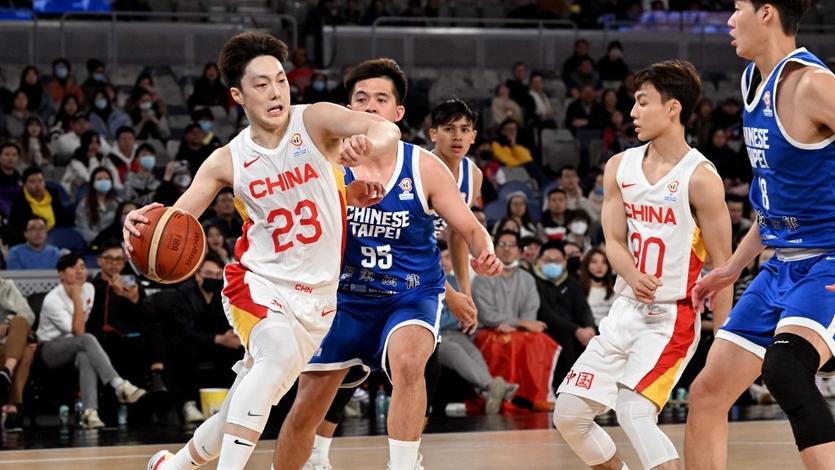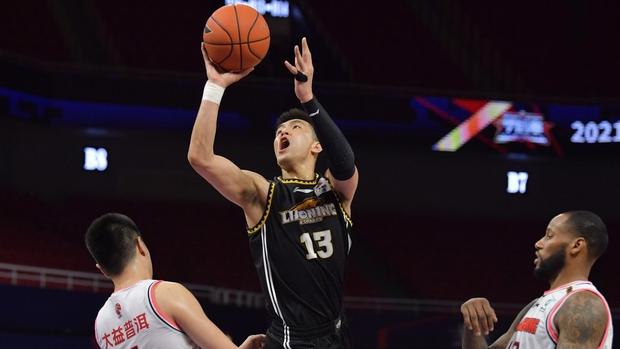 China's Hu Mingxuan (left) drives into the key during the FIBA Basketball World Cup 2023 qualifying game between China and Chinese Taipei in Melbourne on July 4, 2022. (WILLIAM WEST / AFP)
China's Hu Mingxuan (left) drives into the key during the FIBA Basketball World Cup 2023 qualifying game between China and Chinese Taipei in Melbourne on July 4, 2022. (WILLIAM WEST / AFP)
Resolutely standing by its salary controls and limits on foreign players, the Chinese Basketball Association remains focused on nurturing domestic talents while staying financially fit in the new season.
As the impact of COVID-19 continues to dry up the league's revenue streams, the CBA underlined its commitment to sustainability and austerity when announcing last week that its strict salary-cap system will remain in place for the 2022-23 campaign.
Under the cap, each club's total wage bill for domestic players must not exceed 44 million yuan ($6.5 million); for imported players, the cap is 5 million yuan.
However, the ceiling that triggers a fine, or what the NBA calls its "luxury tax", has been lowered by 4 million yuan compared to the 2020-21 campaign, when the cap first took effect.
The maximum annual salary for a single player of CBA has been cut by one third compared with two years ago at 6 million yuan for the new season, which will tip off on Oct 10
The maximum annual salary for a single player has been cut by one third compared with two years ago at 6 million yuan for the new season, which will tip off on Oct 10.
Once again, games will take place in bio-secure bubbles, at least for the first nine rounds of the regular season through Oct 30, according to last week's league announcement. The CBA has yet to decide on the host cities.
Clubs will be fined as much as double the excess should they pay more than the wage limit as the league calls on teams to tighten their belts in lean economic times when the absence of spectators in arenas has cut off game-day revenue for the last two and a half years.
The CBA, however, will reassess the country's epidemic control situation after the FIBA World Cup qualifying window in November and will possibly resume league play in the traditional home-and-away format.
"A sound financial status is key to a league's sustainable development, and the implementation and adjustment of the salary-cap system has been essential to achieving that goal," read last week's CBA statement.
"Lowering the cap ceiling was a reasonable decision considering the challenging market situation and difficulties of club operations."
The 2022-23 regular season will see each of the 20 clubs play 42 games-up from 38 last term-before the top-12 finishers advance to the playoffs. The 20 teams will be divided into four groups, presumably hosted by two arenas in one city, where each team plays every group opponent three times and each team in the other groups twice.
READ MORE: China edges Bahrain in FIBA Asia Cup
 Guo Ailun (center) of the Liaoning Flying Leopards goes for a layup during the CBA playoff semifinal against the Guangdong Southern Tigers in Nanchang, East China's Jiangxi province, April 16, 2022. (PENG ZHAOZHI / XINHUA)
Guo Ailun (center) of the Liaoning Flying Leopards goes for a layup during the CBA playoff semifinal against the Guangdong Southern Tigers in Nanchang, East China's Jiangxi province, April 16, 2022. (PENG ZHAOZHI / XINHUA)
Import conundrum
As part of the league's continuing emphasis on developing domestic talent, the new season has retained the foreign-limit policy from last season. Each club is allowed a maximum of four imported players on its roster, but is permitted to play only one of those at any one time on court.
Despite concerns about the lack of star power in a league that still relies on former NBA talents to boost its appeal, the CBA, chaired by hoops legend Yao Ming, has been unwavering in its stance on reducing the reliance on import players. The hope is that this will allow homegrown talents to play more clutch minutes and thereby aid their development.
A series of recent disappointments on the international stage were attributed by media and fans to the dominating role of foreign players in the league, although some pundits opine otherwise.
Luis Scola, a member of Argentina's Olympic champion team at the 2004 Athens Games, believes that the CBA league's lack of competition for places and what he perceives as Chinese players' complacency are to blame.
Even though more minutes have been given to Chinese players and many ex-NBA players were unable to enter China due to pandemic-related travel issues, foreigners still dominated the CBA's 2021-22 stats for average scoring, rebounds, assists and steals
"You always have the same amount of job positions and you always have the same amount of players. So they know they are always gonna have a job," Scola said in an interview with Chinese basketball commentator Yang Yi.
"We see the Chinese league, there is a very limited number of foreign players and that creates a lot of jobs so they (local players) always have their positions. Nobody is pushing you ... and that slows you down," said the former NBA forward who played in the CBA from 2017-19 in the twilight of his career.
Scola cited his experiences of playing in Spain's top league from 1999-2007, when import restrictions did not have the desired effect of boosting domestic talent.
"Turned out they were completely wrong," Scola said. "It was actually the other way around. After that (loosening the limit) happened, their national team became the biggest in (the country's) history. If you elevate the level of competition, then they will have to elevate their game too if they want to play by competing with the best foreigners you can get. The better your league is the more chances to grow as a country you have."
Even though more minutes have been given to Chinese players and many ex-NBA players were unable to enter China due to pandemic-related travel issues, foreigners still dominated the CBA's 2021-22 stats for average scoring, rebounds, assists and steals.
The national team's disappointing quarterfinal loss at last month's FIBA Asia Cup to Lebanon, an opponent it had previously beaten 11 times in a row, exposed the declining power of Team China even in continental battles. The loss was the team's second straight early exit at the tournament since the 2017 edition.
As the only standout performer against Lebanon, star center Zhou Qi believes a lack of elite-level competition is stunting Team China's development.
"I think we need to better adapt to the physical and high-intensity play on the international stage," said Zhou, who played with the South East Melbourne Phoenix in Australia's top-flight NBL last season.
"The fact is that most of us are not playing in a competitive enough environment at home, so we struggle every time trying to match the intensity, physicality and hustle at international tournaments."


